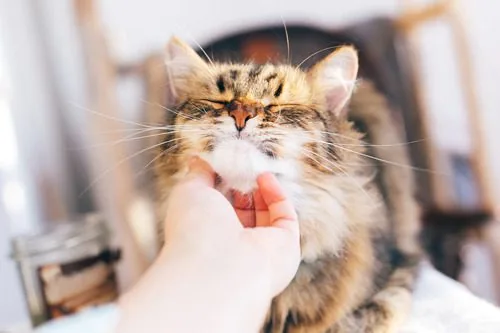Cat Drooling: Is It Normal?
It’s not unusual for cats to hide their symptoms when they’re not feeling well. So when something noticeable happens like your cat suddenly drooling, it can raise alarm bells. Some cats drool when they’re relaxed and content, but other times, drooling can point to an underlying issue. Understanding when cat drooling is normal and when it signals a concern can help you act quickly and protect your cat’s health. Below, we’ll explain what causes cat drooling, when it may be a reason to schedule a vet visit, and how Warrick Veterinary Clinic in Warrick County, IN can help. If you’ve ever found a mysterious wet spot on your shirt after a cuddle session or noticed your cat drooling excessively while napping, read on to learn what this behavior could mean.

What Causes Cat Drooling?
Some causes of cat drooling are harmless, while others may require veterinary attention. Understanding the range of possibilities can help you decide what steps to take next.
Normal Situations Where Cat Drooling Occurs
Certain circumstances can lead to drooling without signaling a health problem. Cats may drool when:
- They’re extremely relaxed, especially while kneading or purring
- They’ve just been given medication with a bitter taste
- They’ve smelled or tasted something unusual, such as a plant or cleaning product
- They’re excited or slightly nervous, especially during car rides
Mild drooling in these situations typically resolves quickly. If it becomes more frequent or is accompanied by other symptoms, it could point to something more serious.
Dental and Oral Health Issues
One of the most common medical causes of cat drooling is dental disease. Inflammation, infection, or pain in the mouth can cause your cat to salivate more than usual. Conditions that may lead to drooling include:
- Gingivitis and periodontal disease
- Tooth resorption
- Mouth ulcers
- Foreign objects stuck between the teeth
- Broken or fractured teeth
These issues often go unnoticed until they start to interfere with eating or grooming. If your cat has bad breath, drops food while eating, or paws at their mouth, it’s a good idea to schedule a dental evaluation.
When Drooling Is a Sign of a Bigger Problem
Not all drooling is innocent. If your cat’s drooling is excessive, persistent, or accompanied by other symptoms, it’s time to investigate further.
Exposure to Toxins
Ingesting or licking a toxic substance can trigger drooling. Common household items that are dangerous to cats include:
- Certain plants, like lilies or philodendrons
- Human medications
- Cleaning products
- Pest control substances
- Essential oils
Toxin exposure often results in drooling, vomiting, lethargy, or difficulty breathing. If you suspect your cat has encountered a harmful substance, contact your veterinarian immediately.
Nausea or Motion Sickness
Cats sometimes drool before vomiting or when they feel nauseous. Motion sickness during car rides can also result in excessive salivation. If this happens consistently while traveling, your veterinarian can suggest solutions to make the ride more comfortable.
Oral Growths or Tumors
Masses in the mouth or throat, whether benign or malignant, can interfere with swallowing and trigger drooling. These growths may be visible, or they may be deeper in the mouth or under the tongue. If your cat’s drooling comes with difficulty swallowing, facial swelling, or decreased appetite, further diagnostics may be needed.
What to Watch for Alongside Drooling
Drooling by itself doesn’t always indicate a problem, but it’s often accompanied by other signs that point to a deeper issue. Monitoring your cat’s overall behavior and physical condition can give you helpful clues.
Red Flags to Look Out For
Call (812) 897-4855 to schedule an exam if you notice drooling along with:
- Bad breath or a foul odor from the mouth
- Changes in eating or drinking habits
- Blood in the saliva
- Swelling around the mouth or face
- Difficulty swallowing or chewing
- Lethargy or hiding behavior
How to Help Your Cat Stay Comfortable
While only your veterinarian can diagnose the cause of drooling, you can help by noting when it started, how often it occurs, and whether anything seems to trigger it. Keep your cat away from plants, chemicals, and unsafe human foods, and make sure their dental health is checked regularly.
How Warrick Veterinary Clinic Can Support Your Cat’s Health
At Warrick Veterinary Clinic, we take your concerns seriously, especially when they involve visible changes like cat drooling. Drooling isn’t always normal, and we’re here to identify the cause and recommend next steps. Our team offers advanced diagnostic tools and gentle, compassionate care to evaluate your cat’s condition and get to the root of the issue. Whether your cat needs a thorough dental exam or support for a possible illness, we’ll walk you through the process and keep you informed every step of the way. We also encourage preventive care and routine checkups to help detect concerns before they become more serious. To schedule an appointment or speak with our team, call us today at (812) 897-4855.
